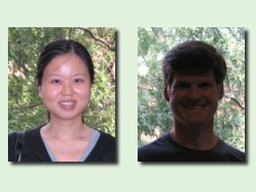Location
University Center : 115
Date & Time
May 3, 2017, 11:00 am – 12:00 pm
Description
| Session Chair | Juyoung Jeong |
| Discussant | Dr. Rathinam |
Speaker 1: Yun-Ju Cheng
- Title
- Marginal Meta-Analysis for Randomized Clinical Trials with rare events
- Abstract
-
Since rareness in adverse events studies is commonly seen in medical product associated RCTs (Randomized Clinical Trials), standard Meta-analysis (MA) is facing three challenges in combining those RCTs for safety evaluation: (1) Debate on whether including 0 trials or not continues, add-hoc continuation corrections were proposed to make the best use of available data and improve the MA performance. (2) MA’s significant findings may change across different effect measures on the same data. (3) Under same effect measure, MA’s significant findings may change after switching MA estimation methods. Moreover, the use of fixed or random effects MA relies on Cochran’s heterogeneity test, which has low power with rare events.
In this paper, we investigate the validity assumptions behind standard MA and relax assumptions by removing the association to a specific effect measure. We proposed a marginal MA estimator that provides not only a consistent treatment effect estimate for marginal causal effect but also address the challenges. Simulation study shows the proposed estimator performs reasonably well and Avandia as a case study.
This is a joint work with Yi Huang, Elande Baro, and Guoxing Soon.
Speaker 2: Michael Retzlaff
- Title
- Semismooth Newton Methods for l1 regularization—Towards Global Convergence
- Abstract
- In this talk we will describe a semismooth Newton (SSN) method for l1 regularization first developed by Griesse and Lorenz (2008) designed for optimization of ill-posed problems. After developing the SSN method, we will show encouraging numerical results as it is applied to digital image restoration. While it has been proven that the SSN method is superlinearly convergent locally near a minimizer, we can easily construct examples with certain initial data and parameters which will not converge. As such, we wish to modify or supplement the algorithm so that we can achieve fast convergence globally. In the final part of our talk we will discuss the globalization issue, with current advances in globalization techniques, as well as some ideas currently in development.
Tags:
